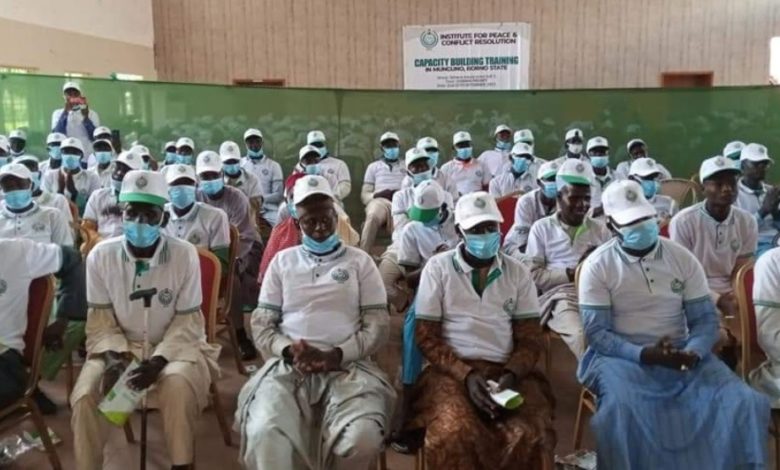450 Returnee IDPs Get Cash, Training On Conflict Management In Borno
The training which was facilitated by a Borno lawmaker was to help the IDPs reintegrate easily.

About 450 Internally Displaced Persons (IDPs) returning to their reclaimed communities have been trained on conflict management, a mechanism they need to settle down for a post insurgency livelihood.
The IDPs were coached for two days by conflict management experts from the Institute for Peace and Conflict Resolution (IPCR) in Maiduguri, Borno State capital in Northeast Nigeria.
At the end of the two-day exercise, the trained IDPs also got N50,000 cash support from Mohammed Monguno, a member of the House of Representatives, whom HumAngle understands co-sponsored the “much-needed training.”
HumAngle learnt that the IDPs were selected from Marte, Monguno, and Nganzai Local Government Areas (LGAs) of Borno State, which formed the federal constituency that the federal lawmaker represents at the National Assembly.
The lawmaker said the participants, mostly women and youths, needed to be equipped with basic knowledge of conflict management as they return “to their various liberated wards and communities, especially on the need for peace and development.”
The two-day session also provided them with knowledge of how to start farming and other Small Scale Businesses (SSBs) for their self-reliance economically in a post-conflict setting.
Monguno, who is also the Chief Whip at the Federal House of Representatives said the workshop and empowerment was the second phase of such palliatory support he has provided to displaced members of his constituency.
Two weeks ago, Monguno’s office and the Centre for Management Development (CMD) donated N20 million and sponsored a three-day agricultural workshop for a batch of 400 beneficiaries in poultry, goat and fish farming as well as soap making.
“We still give each of them cash support of N50,000 to state the business for which they were trained,” he said. He said his idea of helping the people affected by conflict is giving them the capacity to stand on their feet.
Dr Bosede Awodola, Chief Executive of IPCR, beseeched participants at the training to use the knowledge positively as “Ambassadors of Peace in the society.”
“I am happy to be with you throughout this very important capacity building; and I want to use this opportunity to thank Hon MT Monguno who is your representative at the national assembly for sponsoring this training,” the head of IPCR said.
“I also commended the efforts of Nigerian Security Forces, Government and the people of the region in their collective move defeat insurgents, which forced about 8,000 terrorists laid down their arms and massively surrendered recently, a situation that would pave a way for sustainable peace and development not only in the constituency, or Borno, but the country as a whole.”
Suleiman Mohammed, who is one of the facilitators at the workshop, informed the trained IDPs to always remember that: “Peace is not the absence of conflicts, but it is the ability to settle the disagreement by peaceful means.”
He implored the people “to work for peace, prevent violence and respect differences” as they go back to ancestral homes “to pick up your pieces.”
The federal lawmaker had in his goodwill message, noted that “the 12-year atrocities posed by Boko Haram has dealt decisively on the socio-economic well-being of millions of people in the constituency.
The lawmaker also announced that he had also provided N300 million to a civil engineering company “for the rehabilitation of some roads and drainages within some of the liberated towns and its environs of his constituency.
He said peace can only be sustained if members of the public shun negative behaviours and other related vices that can lead to further violence in the state.
Two of the beneficiaries, Isa Bukar and Babagana Monguno thanked the lawmaker for making the training happen even as they promised to “always preach peace” in their communities and also “use the money to start genuine small businesses.”
Support Our Journalism
There are millions of ordinary people affected by conflict in Africa whose stories are missing in the mainstream media. HumAngle is determined to tell those challenging and under-reported stories, hoping that the people impacted by these conflicts will find the safety and security they deserve.
To ensure that we continue to provide public service coverage, we have a small favour to ask you. We want you to be part of our journalistic endeavour by contributing a token to us.
Your donation will further promote a robust, free, and independent media.
Donate HereStay Closer To The Stories That Matter




